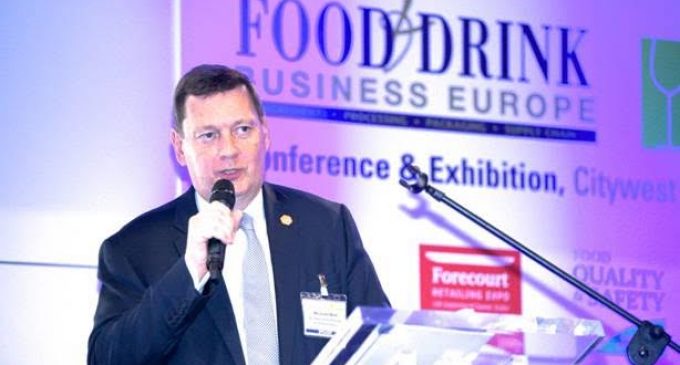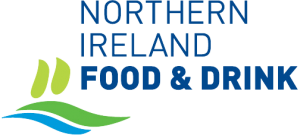Brexit – A View From the North

“We lobbied very hard against Brexit,” said Michael Bell (pictured right), CEO of the Northern Ireland Food & Drink Association, at the start of his key note presentation, entitled: ‘ Brexit – A view from the North’, to the Food & Drink Business Conference and Exhibition, held at the Citywest Convention Centre in Dublin.
The Northern Ireland food and drink industry supports 100,000 jobs and has an annual turnover of £4.6 billion, of which £708 million is generated by trade in the Republic of Ireland. Indeed, agrifood is the largest indigenous industry in Ireland – North and South – but is export dependent.
Indeed, the food and drink sectors in both Northern Ireland and the Republic of Ireland are closely entwined. For example, 40% of the milk produced in Northern Ireland is processed south of the border. “Currency fluctuations damage both industries. The industries North and South are co-dependent,” he commented.
According to Michael Bell, continued growth of the industry in Northern Ireland is dependent on the type of trade deal the UK negotiates with Europe. “Access to labour and common standards are going to be crucial.” He added: “However, London is short on resources as agrifood trade deals have been negotiated by the EU for many years.” The level of any future tariffs is going to be critical to the future development of the industry in Northern Ireland.
The average net profit margin for the food and drink manufacturers is roughly 3% and about 2.7% in Northern Ireland. “Any tariff that starts to go beyond those numbers is untenable for food and drink manufacturers.” He continued: “Access to global markets is critical to make the sums work. Tariffs will restrict markets.”
Trading Models
However, the trading models, including those used by Norway and Switzerland – that provide free access to the European market also entail a contribution to the EU budget and free movement of people – both of which are red line issues for many Brexiteers.
 Other trading options have been suggested such as the high tariff trading WTO regime but this could risk greater access to the UK market for meat and dairy products at lower prices but also with lower standards of production. “The more the UK wants to do its own thing, the higher the tariffs,” he pointed out.
Other trading options have been suggested such as the high tariff trading WTO regime but this could risk greater access to the UK market for meat and dairy products at lower prices but also with lower standards of production. “The more the UK wants to do its own thing, the higher the tariffs,” he pointed out.
Regarding future UK Government policy on agriculture, he remarked: “There is a danger that the voices in City of London will over rule the agribusiness lobby.”
He continued: “The situation is fluid and we need to be fluid in developing responses to the changing landscape. Depending upon whether you are an optimist or a pessimist, we are either about to walk into a minefield or a new dawn. We have to change the mindset.”
He pointed to the increased funding for the various food marketing and development agencies across Ireland and Great Britain. “We are spending tax payers money knocking the ‘tripe’ out of each other in these islands. Brexit is a huge opportunity to deliver closer collaboration in the agrifood industry to drive exports from these islands.” He cited tourism as a model that could be useful in this regard.


































